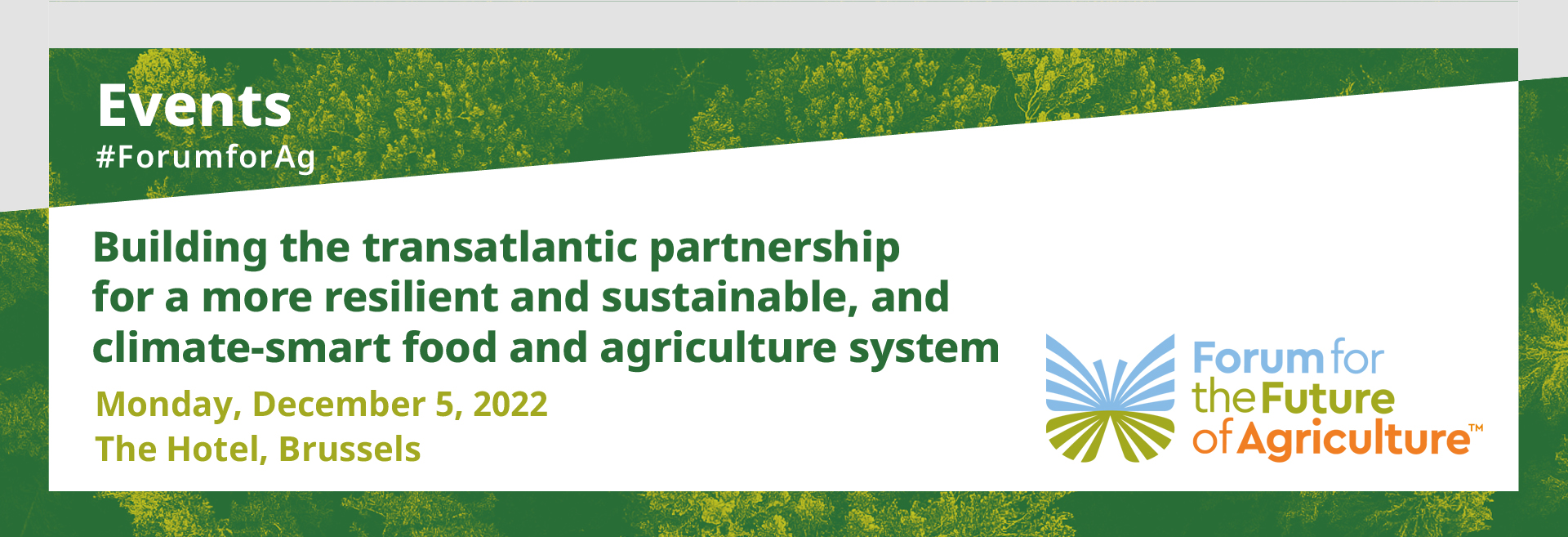Building the transatlantic partnership for a more resilient and sustainable, and climate-smart food and agriculture system
2022 meeting - Session 1 summary
Monday, Dec 05, 2022
Opening remarks
Janez Potočnik, Chair of ForumforAg 2022 and Chairman the Rise Foundation; Co-Chair of the International Resource Panel of the United Nations Programme (UNEP), welcomed participants, especially the delegation which had travelled from the US. Noting that the meeting was taking place on World Soil Day, he said that together, the EU and the US, “have enormous influence and the ability to affect change on the big strategic challenges of our time”.
Calling for full scale system change, he asked participants to bear certain questions in mind during their discussions. What is needed to take innovation further and faster? Who should work together to make ideas and innovation systemic? How would greater EU-US collaboration help?
Investment in innovation for sustainable agriculture and the Green Deal ambition
Robert Bonnie, Under Secretary for Farm Production and Conservation, USDA, speaking online, explained the US approach towards global food security and climate change. In his keynote address, he pointed to the alignment between good agricultural practices and the environment, delivering benefits for the economy, productivity and climate.
The Biden administration is using a farmer-led voluntary approach based on incentives, market opportunities, partnerships and collaboration, rather than top-down regulation, to encourage the necessary conservation practices, while ensuring productivity is maintained. He pointed to the $2.8 billion investment in partnerships for climate smart commodities, the Inflation Reduction Act and other programmes enabling the government to share costs with the agricultural sector.
He emphasised the need to “focus on outcomes versus certain prescriptions”, on the importance of the US-EU partnership and exchange of information between their policymakers and farming communities.
Lukas Visek, Member of Cabinet, Executive Vice-President, European Green Deal, European Commission, set out some of the institution’s recent initiatives in his keynote speech. It has proposed a European soil strategy and will table a first ever soil health law, creating a regulatory framework as exists for other natural resources, such as water and biodiversity.
This will be accompanied by an enabling environment of research and promotion of soil friendly practices, eco-schemes rewarding farmers for their stewardship of public goods and development of new business models. The Commission’s recent proposal for carbon removal certification aims to extract and store millions of tonnes of carbon from the atmosphere to help achieve climate neutrality by 2050.
He stressed the need “to get into the paradigm of delivering on more than one objective”, pointing to the ability of precision agriculture to save costs and inputs, while raising farmers’ incomes. Farmers alone cannot deliver the transition. This must take place along the entire food chain, including tackling the 20% of food wasted in the EU every year.
Panel discussion
Kerstin Rosenow, Head of Unit Research and innovation, DG AGRI, European Commission, spoke of the need “to bridge the gap between practice and science, technology and application” to make social, economic and environmental sustainability a reality. The EU was increasing investment in agricultural research, using a bottom-up approach taking account of local conditions. This was bringing benefits in areas such as soil recovery and replacement of synthetic fertilisers.
Jeremy Rollison, Senior Director, EU Government Affairs, Microsoft, explained the company is helping its customers “do more with the data and tools and requirements that they have in front of them”. These involve tracking and reporting obligations, sharing lessons on carbon removal and application of precision farming. The company works in partnership with its customers as it develops cloud and software solutions. “I think the green transition will only be successful if there’s a successful digital transition alongside.”
Shari Rogge-Fidler, CEO, Farm Foundation and practising farmer, described the organisation as a “do tank” trying to accelerate practical solutions for agriculture. It has four strategic priority areas: sustainability, digital agriculture, farmer health and trade. Her organisation recently launched the Global Forum on Farm Policy and Innovation with the Forum for the Future of Agriculture and other non-partisan, evidence-based bodies. She identified obstacles farmers face such as a decline in extension services and partners to provide advice and a shortage of labour.
Giulia Riedo, Junior Policy Officer for agriculture and sustainable food, WWF EPO, noted that discussion on digital transition and technology in agriculture tended to focus on productivity and the economic side of sustainability. This needed to be broadened to “talking about how we are going to use our land and also shifting our attention, not only on production, but also on the consumption side”. The food industry has a key role to play in the transition since it influences what is sourced from farmers and offered to consumers.
Chris Harbourt, Chief Strategy Officer, Indigo Agriculture, presented the voluntary carbon programme his company has developed using soil as the sequestration. This involves “educating the buyers, educating the growers, pulling that together and then actually issuing credits”.
The programme producing real, measurable and repeatable carbon credits now operates in 32 US states and expanded to India, South America and Europe. “These programmes really come down to financing vehicles that incentivise behaviour change and work with growers,” he said, calling for a minimum price or support for farmers to expand its appeal.
Click here to view videos from this event.
Click here to view the agenda and speakers bios from this event.





